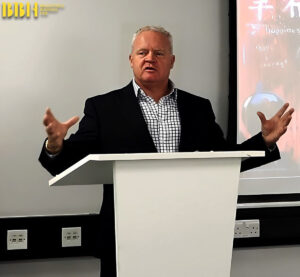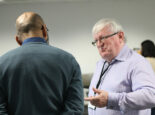Bare-Knuckle Business

No stranger to the slings and arrows of the business world, former Secret Millionaire Mike Greene has known success and failure in equal measure. Learning to treat the latter as a learning experience has given Mike a formidable attitude to reaching the top, and staying there – and he’s keen to bring others along for the ride. We spoke to him to find out more...
The business landscape has undergone a lot of shocks over the past ten years, with Brexit and the pandemic to name just two. Is this what prompted a move into podcasting, or was media like this always the plan?
It would have probably happened naturally, because I’ve always been passionate about the systems and behaviours that people use, whether they do it knowingly or whether it’s just their natural approach to being successful. What drove it for me is when people would say things like, “Oh yeah, pay me ten grand, and I’ll tell you the secrets to success”. And that used to annoy me because it sort of suggested that there were two secrets, and if you knew them, you would suddenly become a gazillionaire, or that there was some snake oil, stardust that you could spray on people and they would be successful. The reality is: there are no secrets, and there is no stardust. It is about the systems that people use to become successful, whether it’s time management, people management, attracting the right people, good marketing, good branding, pricing strategies and so on. It’s all about the systems. So, the podcast just became a natural evolution of the questions I’d be asking successful people, like – how did you do that? Oh right, what about people? And how did you manage cash? That kind of thing. So they were conversations I’ve always had, but it became clear that I was getting them in a chair – whether informally or through mentoring – but podcasts were a way to do it on a broader scale. And it also became like a shortcut and a window into my own musings anyway – I was running pizza restaurants, and I would probably still be running three or four pizza restaurants, working stupid hours every day but failure made me look at life differently. I ended up going into libraries and reading books by Branson about his failures and different things, and it made me realise you can fail but that doesn’t mean you’re a failure.
 In terms of advice, you’re very strong on what you think people should do, but what are the things you absolutely think people shouldn’t do?
In terms of advice, you’re very strong on what you think people should do, but what are the things you absolutely think people shouldn’t do?
I wouldn’t say shouldn’t, per se, but everyone believes that the more educated they become, the more successful and wealthy they’ll be – and yet the world’s full of rogue experts and hardworking poor people. So education in and of itself will not make you wealthy, and hard work will not make you wealthy. It’s about how you use the time, and finding the right combination between work knowledge and also replicating proven systems. So I guess for me, what you shouldn’t do is think a piece of paper or qualification is going to make you successful. It doesn’t. And in fact, if you’ve listened to any of the episodes of my podcast, where people like Charlie Mullins, Alfie Best, Mandy Hickson – you can go through the whole list – they followed their passion despite advice to the contrary that they should do something different, even though they hit a lot of barriers and failures. I mean – two things: one is do something you love and you’ll probably still be happier than doing something you hate but getting good money from it. And so even if you don’t make loads of money, it’s still a success if you do something you love all your life. If you actually follow your passion, you’ll probably have a greater propensity to be successful anyway. So don’t do something you hate just because Mum or Dad say you should. I’d often speak at schools – it’s why I got an Honorary Doctorate of Education – the best schools, the worst schools, and so on, and one of the first pieces of advice I would give is to ignore your parents! Often as parents, we tell our kids to do stuff we didn’t do and we try to force them to live the life we didn’t live, because we’re forcing them to succeed in our areas of failure, or trying to, and in doing so we tell them they’ve got
to be a banker, we tell them they’ve got to be an accountant – because that’s what successful people do. But actually, if it’s not their passion, they’re not going to be successful in it anyway.
Yes, because the definition of success does depend on who’s viewing it, doesn’t it? A lot of people in the arts, for example, are poorly paid but for many it’s a dream job. It’s not always about earning the big bucks.
In that regard, chapter one of my book is called ‘First Define Success’. I would say that for a stay-at-home mum, success means being able to be present for their children, and for a teacher, success means making a positive impact on their students’ lives. I also talk about my younger brother who used to travel and live on beaches, surviving on just five quid a day. In my 40s, I realized that, in some ways he was more successful than I could ever be because he was living the life he wanted without the burden of goals and ambition. Success is not solely about money, although it is difficult to be happy without it. You have to be a certain type of person to find happiness without financial success. However, there still needs to be some kind of reward. Firstly, you need to determine what would make you wake up every day feeling successful and fulfilled. Often, even when people pursue money, they eventually realise that they don’t want fancy restaurants or flashy hotels, they want simple pleasures like a homemade pie and a pint, or to be in a cosy cottage with loved ones. The common belief is that success is all about money – but I have never argued with my wife about having too much money (we have argued plenty about not having enough!). However, it is important to first define what success means to you – some people, like my little brother, don’t want money at all. He simply wanted the freedom to live as he pleased and even that desire was somewhat undefined. He wanted to wake up naturally without an alarm clock, and then decide where he wanted to be to enjoy the sunrise. He moved to India, where he could find the right geography, culture, and economy to live on very little money and he travelled for a year – and that was 25 years ago. Now he has a very successful restaurant there, but it all began with him knowing what would make him happy and successful. So if you were to ask me what three things drive success, based on people’s reflections on their deathbed, I would say it’s following your passion, and then maintaining focus and discipline until you achieve it.
 When you talk about accessing the right people, the right systems – it’s fair to say that those things, in essence social networks and resources, are not evenly distributed. How can people who are working in a void – no mentors, no safety nets, no capital – make your advice work for them?
When you talk about accessing the right people, the right systems – it’s fair to say that those things, in essence social networks and resources, are not evenly distributed. How can people who are working in a void – no mentors, no safety nets, no capital – make your advice work for them?
So, I went to Bretton Woods, which was once described by a prominent psychologist – who is now a head of curriculum at Cambridge – as “a demonised depository for social waste”. The headlines were terrible – all of us kids, including me, asked our mums what that meant. My mum dismissed it, saying it meant nothing but I persisted and asked her to explain. She finally admitted it and explained what was meant by ‘social waste’ and it made me angry. But sometimes, anger can be the motivation to prove these people wrong – and she was clearly wrong. I actually had the opportunity to meet her when I received an honorary doctorate in Education – I told her that she was disgraceful and should never label people. Some individuals might internalise that label and believe it to be true, especially coming from someone in a position of authority and credibility like her. It’s terrible to label people… My daughters attended one of the best schools in the country: academically, they achieved top grades with 11 A* at GCSE, 2 A*s and an A at A-level and one a First in psychology at UCL with the other on-track for the same. You would think they experienced a perfect academic environment – but, that doesn’t mean they have perfect self-belief – in fact, the competition and bullying in private schools are quite high. Some people assume that if you attend a private school, you are bound to succeed but the reality is that they succeed because they work 12 hours a day, seven days a week. If any child, even from the worst school, worked those hours, they would be more successful. So sometimes, it’s the environment that needs to change, not the individuals. If a plant is failing to grow, you wouldn’t blame the seed or bulb; you would consider whether it needs more water, nutrients or sunlight. You would change the environment, not the seeds. Similarly, when a child is failing, we shouldn’t automatically blame the child. Instead, we should examine how we can change their environment. A good education is a great starting point, but it’s worth noting that many millionaires and billionaires came from humble educational backgrounds because it instilled in them a hunger for success. In fact, the individuals I feature on my podcast, who have achieved success – millionaires, billionaires, Olympic gold medallists – often come from non- privileged backgrounds. They possess a different work ethic and level of ambition – and sometimes even trauma.
Explain?
People who have experienced trauma can be affected by stress and anxiety because they grew up with it. As a behavioural profiler, I realised that I developed a passion for it because I naturally had the ability to profile behaviour, and this in turn stemmed from me having a stepfather who was a violent man – from the moment he walked through the door, I would instinctively profile him, observing his anger, tone of voice, and body language. Children who grow up in challenging environments often develop a heightened awareness of these cues. On the other hand, if you’ve grown up in comfort without stress or pressure, you may have better academic abilities but lack the natural skills for life sciences or life skills.
 I don’t believe you’re saying that suffering and trauma are a pre- requisite for success, are you?
I don’t believe you’re saying that suffering and trauma are a pre- requisite for success, are you?
I wouldn’t advocate it as such, but you can recreate it. We were talking about good schools – they often recreate it through sports. You’re teaching the psychology of winning, the importance of training, and the need for consistent training. Someone doesn’t become a world-class musician by suddenly playing hard for one or two weeks – it’s about dedicating 15
or 20 minutes every single day and pushing themselves even when they don’t want to. So I think sports are a sort of recreation of the pressures that make people strong, you know – all the clichés about iron not becoming steel until it’s been through fire. I often say the reason I went to school was to eat because at least I got a cooked meal each day. Now, that may sound like a bit of a throwaway comment, but the reality is that desire drives behavioural change. You don’t want to harm your child or subject them to trauma, but you do want to create circumstances that will, metaphorically speaking, temper them and enable them to handle pressure and challenges, ultimately becoming stronger.
Do you believe in luck?
The moment someone mentions luck, I think of it as the point where opportunity and preparedness intersect – luck is therefore always present but we often overlook it. However, if we are ready and open to recognising it, it is available to everyone, regardless of their level, so you have to adopt a “say yes” attitude, although the last thing you want to do is find yourself climbing a ladder that goes against your long-term goals. I mean, these are all clichés, but that’s something I can relate to. After school, I worked in banking because I thought it was a way to make money. One weekend I realised I’d just had the most boring week of my life, and if you end up saying yes and doing something you hate, no matter how much you earn, you won’t be happy. So, determine what success means to you; what do you want to do? What are you passionate about? After I was on the show Secret Millionaire, there were a few dinners organised with other ‘Secret Millionaires’ such as one sponsored by Coutts Bank. During these events I couldn’t help but analyse and think about the attendees (the other secret millionaires). What made them ALL so successful? Was it about gender? No. Was it about age? No. Was it about cultural background? Education? No. I went through everything to try and identify the common factor that made people successful, and the only consistent trait I found was passion. They were truly driven and passionate about something. And when you meet someone who is passionate about something, even if the topic itself isn’t interesting, it’s captivating to listen to them because passion is infectious. So, find your passion, and you will find your success.
For all things Mike Greene, and to listen to his new podcast, visit mikegreene.co.uk















